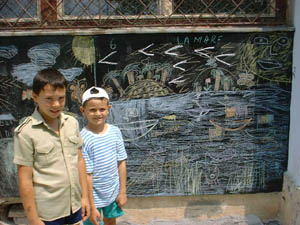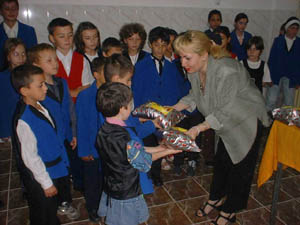Cultural Background
The social situation of Roma population is
getting worse due to political and economical
transition within the Romanian society. Within
this subculture, the children are the first to
suffer from poverty and lack of medical and
social assistance. Further, these children
receive little to no support with their
education at home, as many have illiterate
parents. Under these conditions, it is unlikely
these children will do well or even attend school.
^ go top
What we offer
 The Phillip House is actively working to
integrate Roma children into the educational
system and to prevent school drop-out. We
have set up two Daycare Centers within the
local schools attended by the children, where
they can benefit from specialized educational
support, social assistance, and multicultural
education. The children also receive guidance
with future educational and professional
orientation.
The Phillip House is actively working to
integrate Roma children into the educational
system and to prevent school drop-out. We
have set up two Daycare Centers within the
local schools attended by the children, where
they can benefit from specialized educational
support, social assistance, and multicultural
education. The children also receive guidance
with future educational and professional
orientation.
The two schools provided two classrooms (one each),
which were furnished with new desks, chairs,
cabinets, computer, printer, TV, video-recorder,
and a tape-recorder.
^ go top
Daily Activities

- Assistance with homework provided
by 4 teachers working in the Daycare
Center from School no. 2 and 5 teachers
working in the Daycare Center from
School no. 148
- Tutoring in the most difficult
subjects: mathematics, physics,
chemistry, Romanian language and
literature.
- Daily lunch of sandwiches, fruit,
and sweets
- School supplies and art supplies
- Extracurricular activities: drawing,
painting, singing and dancing, literary
creations, foreign languages courses
(English, French), Romany language courses,
Roma culture and civilization, competitions
^ go top
Other Activities
Supervise meetings between parents and teachers;
children and teachers; children, teachers and
parents. Topics include: raising the parents'
awareness about the importance of children's
integration into the educational system;
developing better parenting skills; elaboration
of curriculums; training the teachers in order
to be able to work with disadvantaged children;
discussion of risks implied by the use of drugs,
alcohol and also by prostitution.
^ go top
Social Services

- Create and update personal records
for each child, which include family
background, school record, medical
record, and a personal/social needs
assessment
- Implement an appropriate intervention
strategy based on individual needs
- Provide regular individual counseling
to address children's emotional and
behavioral needs
^ go top
Results
Since the beginning of this project, the
children's grades have steadily improved
and drop-out has been prevented, as all of
the children within the program have
remained in school. The response from
the children and their parents as well
as the educational community has been
overwhelmingly positive. The excellent
results of this program indicate that Roma
integration within the educational system
can be successfully achieved.
^ go top
|



